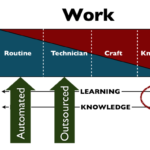When the SARS-2 pandemic hit the global community, many organizations were able to quickly pivot to remote work, among other adaptations. This will likely not be the last pandemic and other crises will emerge that will require more adaptations to how work gets done. The AI tidal wave may even increase the pace of change. In these environments, learning and innovation have to be woven into the fabric of daily work.
“In a crisis, you should always deploy an innovation team alongside the business recovery teams … to capture the novel practices … put naive observers in alongside the incident team to capture the key learning points.” —Dave Snowden, Complexity Expert
Developing training programs for all potential eventualities is a futile endeavor. Organizations and teams need to learn as they work. As learning strategist, Lori Niles-Hofman noted at the beginning of the pandemic, “Stop work on that coronavirus eLearning module you started last week. It is already out of date. Focus on curation and access.”
More of our challenges will be complex and some may even be chaotic. In complex environments we should make small continuous probes, make sense as we do them, and develop emergent practices as we work. In chaos we have to take action, any action, try to sense where there is some stability, and develop novel practices
Taking note of what is happening every day will inform our collective memory in the future, when we may have to deal with another global crisis. For example, climate change may be slowed down a bit this year but it is still a slow-moving ‘black swan’ event we will collectively face. We need to map new stories so that we can act in a more informed way in the future.
Learning in this complexity and chaos should be — observation > narration > curation. Start by listening, then put observations together, and later curate these for sharing across the organization.
Observation, narration, and curation can help us adapt to a future of work with smart machines and not-so-smart decisions at all levels of society.


